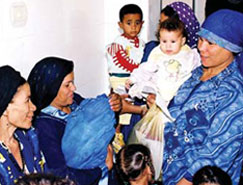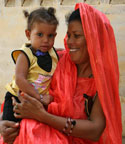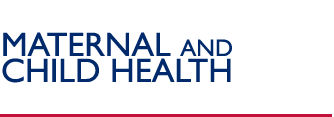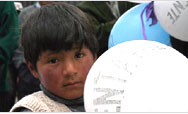Child Health
Saving Lives, Protecting Health
 |
| |
Three decades of assistance from USAID has helped the Government of Egypt dramatically reduce deaths among pregnant women and infants. Read more... [PDF, 149KB]
|
|
 |
|
Ten and a half million children will die this year from easily preventable causes such as diarrhea, pneumonia, and malaria. Many of these children would survive if they were treated with inexpensive, effective, lifesaving interventions such as oral rehydration therapy (ORT) and zinc supplementation for diarrhea, antibiotics to treat respiratory infections, and antimalarial tablets.
Routine child immunizations, nutrition, prenatal care, and safe motherhood have long been top priorities of U.S. foreign assistance. During the 1970s and ‘80s, the USAID-supported research that helped develop interventions and technologies that now save millions of lives each year. Over the past 20 years, the United States has committed more than $6 billion in support of USAID's global child survival efforts. In collaboration with international, national, and private sector partners, this effort has yielded public health successes on an unprecedented global scale:
- Almost a billion episodes of child diarrhea are treated with lifesaving ORT each year, reducing child deaths from diarrheal disease by more than 50 percent.
- More than 100 million children receive a set of basic immunizations each year, and tens of millions more receive supplemental immunizations against polio, measles, and other killer diseases.
- More than 75 million infants and children with pneumonia are taken each year for treatment by trained health workers.
- Malnutrition among children under age five has been reduced from one in three to one in four, a 25 percent reduction.
- The Polio Eradication Initiative has saved an estimated five million children from death or paralysis.
- Half a million children are estimated to be saved annually by micronutrient supplementation programs.
USAID has provided technical and commodity assistance to more than 100 countries in support of child immunization programs. The Agency also works closely with its international partners to bring more attention to immunization programs and generate greater resources to help countries improve their capacity to deliver lifesaving vaccines. Major elements in this effort include USAID's participation in the Global Alliance for Vaccines and the Immunization and the Vaccine Fund and its collaboration with private sector groups such as the Bill and Melinda Gates Foundation. USAID is committed to providing technical support to national immunization programs through the Boost Immunization Initiative and collaboration with nongovernmental and private voluntary organizations.
To combat illness in children and create a safer future for the world, we have to care for newborns, train midwives, develop new vaccines for respiratory infections, sponsor community-driven health interventions, and promote the use of insecticide treated nets to prevent malaria.
If child health is a priority, the future, theirs and ours, will be secure.
 |
| Source: USAID/Senegal |
Health Research Program (HaRP)
Through collaborating partners, USAID's Health Research Program (HaRP) identifies the challenges for maternal and child health in developing countries and countries in transition, and designs the most effective approach to overcome them. These challenges range from infectious diseases to malnutrition to health services delivery by community health workers.
Visit the HaRP website at http://www.harpnet.org
|


